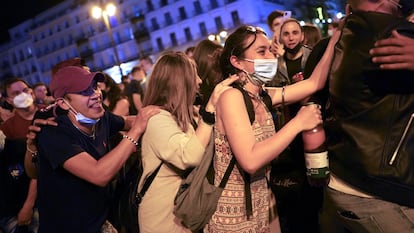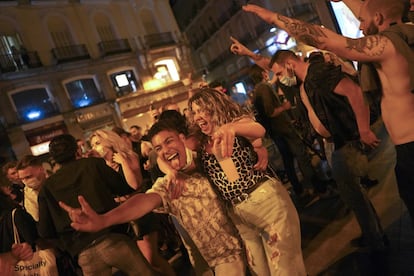Outdoor parties erupt across Spain as state of alarm ends
Thousands of people took to the streets Saturday night after coronavirus restrictions such as the curfew expired

The first night without the state of alarm saw an atmosphere of partying in many parts of Spain on Saturday night, as revelers took to the street from midnight onward when the emergency measures that had been in place for six months in a bid to control the spread of the coronavirus expired. The festivities took place on the streets of the country despite the fact that the epidemiological data is far from good.
While the 14-day cumulative number of coronavirus cases per 100,000 inhabitants began to fall last week, the trend is still very weak after several weeks of a plateau in the key data point. On Friday, the last day when official data was released, there was an average of 198 cases, a level that the Health Ministry calls “high risk.” Five regions, meanwhile – Madrid, Catalonia, Navarre, Aragón and the Basque Country, as well as the North African city of Melilla – are above 250, considered to be “very high” risk. But the people on the streets on Saturday night appeared oblivious to this reality.

In Madrid, the crowds flocked to the Puerta del Sol, a place where traditionally the New Year is seen in, but this year was deserted on December 31 due to the restrictions. The police made 450 interventions during the night. The region currently has a 14-day cumulative incidence per 100,000 people of 317. In Barcelona, meanwhile, the authorities had to move 6,500 people on from a number of different squares. And in Palma de Mallorca, 16 arrests were made and four National Police officers were injured at an improvised party that was in contravention of the nighttime curfew that remains in place in the Balearic Islands. “These are deplorable images,” complained the mayor of Madrid, José Luis Martínez-Almeida, speaking on Sunday.
Among the crowds in Madrid’s Puerta del Sol on Saturday night, one of the cries regularly heard from the crowd was: “Freedom!” This was in reference to the campaign slogan of conservative Popular Party (PP) candidate for regional premier, Isabel Díaz Ayuso, who has long been at loggerheads with the central government over the need for strict coronavirus restrictions. In fact, the region has had some of the laxest measures in the country for some time now.
One of the consequences of the end of the six-month state of alarm – which was put in place by the central government to give the regions a legal framework within which they could restrict fundamental rights such as mobility – was an end to nighttime curfews in most regions. This was the case in Madrid, which saw the last such curfew come into place at 11pm, only for the restriction to be lifted an hour later. “Now the botellones are going to start,” commented one municipal police officer stationed near the Puerta del Sol on Saturday night, in reference to the practice of street drinking in groups, known in Spanish as a botellón, literally “big bottle.”
#sol #madrid fin del estado de alarma pic.twitter.com/vbd5iec7gv
— Luis de Vega (@Ldevega) May 8, 2021
Despite the crowds, the National Police confirmed on Sunday that there were no serious incidents in the Spanish capital during the night – no arrests, police charges or injuries. The only notable incident was seen in a bar in the Chamberí neighborhood, in which there were around 20 people. When the police tried to enter, the owner pulled down the shutters. “Glasses were thrown at officers and there were also a number of kicks,” the police report read. The patrons took advantage of the confusion to exit via a back door.
“Freedom does not consist of breaking the rules,” stated Madrid Mayor Almeida on Sunday. “This is behavior that we must condemn from City Hall,” he added, explaining that an additional 200 municipal police officers had been deployed. He also thanked the central government’s delegation in Madrid for its support.
In Barcelona, crowds started to form a few minutes after midnight in Barceloneta. The night progressed as the local police had expected, with street drinking, crowds, music, dancing and other excesses in the open air despite a strengthened police presence, who counted on 30% more officers than usual that night. The police spent the first few hours trying to clear the crowds. “A maximum of six people please,” they were heard to instruct, in line with the restriction that the Catalan government had opted to keep in place on social meetings. But their mission was an impossible one from the start. The parties that sprung up around the city were like a many-headed monster. Every time one was shut down, another would appear.
The authorities in Barcelona reported moving around 6,500 people from 31 different locations. The biggest crowds were seen in the Gràcia and Arc de Triomf neighborhoods, as well as Bogatell beach.
In Palma, 16 arrests were made – including one minor – and four National Police officers injured after an unauthorized protest against curfews, vaccines and masks took place in the center of the capital. Around 300 people, according to the police, met illegally in Plaza de España shouting slogans against the restrictions. Despite calls from the authorities to disperse, the crowds threw cobblestones, bottles and stones at the officers in the area. The police eventually charged against the protestors. There was damage to street furniture and to vehicles parked nearby.
In Seville, the public packed out sidewalk cafés but there were no major incidents or arrests. The Andalusian capital saw the partying go on beyond midnight, which is when bars must close, given that those establishments with a music license are now permitted to stay open – albeit with the same capacity restrictions as any other bar. Dance floors remain shut, meanwhile.

In the Castilla y León region, Salamanca saw the highest number of calls to the 112 emergency line, with nearly 50 or so complaints about noise and the dozen or so botellones and crowds that had formed without respecting social distancing. At midnight, there were around 500 people in the Plaza Mayor of the city, and from there the crowds spread out to a number of different areas, in particular Puente Romano.
In the Basque Country, there were a number of parties and street celebrations in the three capital cities –Vitoria, Bilbao and San Sebastián – and many municipalities, although without any significant incidents according to the authorities. In Vitoria and Bilbao, there were hundreds of youngsters in the center from midnight onward, some of whom were letting off fireworks.

A number of police units put a stop to the mass festivities in municipalities such as Getxo. There were few incidents on the roads joining Bilbao and nearby Cantabria, although there was heavy traffic at some moments until 2am. Thousands of residents in Bizcaya have second residences in municipalities such as Castro Urdiales and Noja.
Based on reporting by Luis de Vega, Eva Sáiz, Lucía Bohórquez, Juan Navarro, Bernat Coll, Pedro Gorospe and Berta Ferrero.
English version by Simon Hunter.
Tu suscripción se está usando en otro dispositivo
¿Quieres añadir otro usuario a tu suscripción?
Si continúas leyendo en este dispositivo, no se podrá leer en el otro.
FlechaTu suscripción se está usando en otro dispositivo y solo puedes acceder a EL PAÍS desde un dispositivo a la vez.
Si quieres compartir tu cuenta, cambia tu suscripción a la modalidad Premium, así podrás añadir otro usuario. Cada uno accederá con su propia cuenta de email, lo que os permitirá personalizar vuestra experiencia en EL PAÍS.
¿Tienes una suscripción de empresa? Accede aquí para contratar más cuentas.
En el caso de no saber quién está usando tu cuenta, te recomendamos cambiar tu contraseña aquí.
Si decides continuar compartiendo tu cuenta, este mensaje se mostrará en tu dispositivo y en el de la otra persona que está usando tu cuenta de forma indefinida, afectando a tu experiencia de lectura. Puedes consultar aquí los términos y condiciones de la suscripción digital.









































